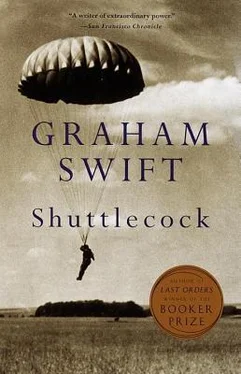I still go to see Dad on Wednesdays and Sundays. He still sits on the wooden bench, gazing before him, as indestructible, in his silent impenetrability, as the Bionic Man himself. I have not yet put to him those fatal questions which at one and the same time might restore and destroy my father. Did you betray your fellow-agents? Did you really escape from the Château? Did you sleep with Z’s wife? In my mind these questions sound like the key-notes of some fresh interrogation, and Dad has already undergone one interrogation, already endured trials enough. And why should his own son appear to him in the role of interrogator — as the ghost of fat-cheeks, grey-hair and ‘ le goret ’, all rolled into one? Sometimes I see how easily this red-brick mental hospital, with its tranquil gardens, could turn, in the instant, from a place of refuge to a place of torture. And when I ask myself what my motive might be in putting those questions, I find myself wondering whether it would really be to see at last, after the restorative shock, a flash of recognition cross those eyes; or whether it would be to exult over the confession of some ignoble truth. And it seems to me that I care very little for the morals, the rights and wrongs of the case — whether Dad betrayed those three agents, whether he slept with another man’s wife. My feelings would not be immensely changed towards a father guilty of those acts. But what does interest me, intensely, exclusively — is whether Dad cracked. For, as with Martin, you see, it is perhaps a matter not of attitude but of physiology.
But I know I won’t ever ask those fatal questions. And I won’t make further inquiries of my own. All this was decided that evening at Quinn’s. Perhaps that means that Dad will never return from the land of silence. But then I sometimes think, with the knowledge I have but don’t show Dad, and the knowledge Dad perhaps has and believes I don’t, our relations could not be more finely tuned than they are. Every time we sit on that wooden bench, which has often seemed to me like some uneasily rocking see-saw, there are no longer those sensations of tilting and swaying — as if by some mutual, tacit arrangement, we have found the perfect balance.
And if the way I am talking suggests that, behind all my reticence, I really do believe that Dad did all those things that X accused him of, and that, indeed, is the reason for my reticence, then let me assure you that that question, too, hangs like a finely poised balance. For a long time I would still read Shuttlecock ; I still pored over its pages, though I was no more certain of what I hoped to find there. And often I found myself asking: the smell of apple logs? the sentry urinating against the Château wall? the woman at Frécourt (in whom — was this my imagination? — there was some faint reflection of my mother)? — all these are too particular, too vivid and intimate to be inventions. And, again: would a man narrating a fictitious escape be at such pains to describe how he was naked?
And then one day (if you want to know, it was only last month, when suddenly buds were on the trees again and I remembered it was a year since Quinn first dropped that hint about my promotion) I stopped reading Dad’s book. I inquired no further. How much of a book is in the words and how much is behind or in between the lines? Perhaps it is best not to probe too deeply into those invisible regions, but to accept on trust what is there on the page as the best showing the author could make. And the same is true perhaps of this book (for it has grown into a book) which I have resumed now after a six months’ lapse, only to bring to its conclusion. Once you have read it, it may be better not to peer too hard beneath the surface of what it says — or (who knows if you may not be one of those happily left in peace of mind by my ‘work’ at the department?) what it doesn’t say.
‘Marian,’ I say (she is still talking to her plants), ‘do you believe in the pathetic fallacy? That it’s really a fallacy, I mean?’
And today — a Sunday — I forwent for the first time one of my visits to Dad. I said to Marian and the kids yesterday evening (for I knew it was going to be one of those hot, cloudless, high-summer Sundays that sometimes come even in early May): ‘Let’s go out for the day tomorrow. Let’s go to Camber Sands.’ And Marian looked at me, as much as to say: ‘But aren’t you going to see Dad?’ And the kids, as much as to say, ‘What about Grandpa Loony?’ But they did not say these things, and their expressions of surprise soon melted. They are a shrewd family.
Why Camber Sands? There are other parts of the coast which are shorter and easier drives from our part of London. Sentimental reasons. It was here that Marian and I used to come when Martin was scarcely beyond the crawling stage; and not just because in the soft sands of the dunes a small baby could come to very little harm, but because in the hollows of those same dunes it was possible for a young couple, with a little circumspection, to spread a blanket and make warm, airy outdoor love.
But it was here too — and it was only because of this that I was to return later with Marian — that I used to be taken as a boy, when we stayed for weekends with Uncle Nigel, a colleague of Dad’s in the engineering business, who had a country cottage near Rye. And what attracted me then about Camber was less its whispering billows of sand and wheeling black-headed gulls (for this was before Mr Forster and his Nature Study classes) but the relics of the war that still littered the region. Rusting tangles of metal to waylay landing-craft; huge, zigzagging rows of concrete teeth waiting to snap at German tanks; pill-boxes marking the dykes on Romney Marsh. All this was scenery from that awesome drama in which Dad had only recently been an actor (these were the late forties and early fifties). And looking out at the grey, flat English Channel, which in that part of the coast retreats to a sullen distance at low tide, I would have a vision of the war as a simple, romantic affair of opposing powers. I would think of watchers on the shore with telescopes; of the dim line of the horizon hiding on its further side massing, unknown forces. I dabbled amongst the rusty iron. Perhaps as I did so — who knows? — Mum and Dad made love, circumspectly, in the dunes. The tide would come in, slick, shallow and frothy — and the incoming tide, as every child knows, is an enemy invader.
And now, invaded and littered in another way — by caravan-sites and chalets, beach-side cafés and amusement arcades — Camber Sands still retains these old savours of love and war. Don’t ask me why, knowing that this spot must be even more spoilt, even more strewn with seaside junk since Marian and I last saw it, I should still determine on going there — I who have this hankering for untouched countryside and have often harangued and bored my family with conservationist lectures. Perhaps certain things are inside us and we don’t have to go searching for the appropriate setting in order to find them. Or if they aren’t inside us, then — perhaps we should admit it — they aren’t anywhere.
We packed a picnic bag, blankets, towels, swimming things, sun-tan oil, and set off early. I slipped into our car boot my cricket bat and a ball (for there is no finer cricket ground than the damp flat sands of Camber when the tide is out). But I would not push the point. Peter sat in the back seat with Marian. He was excited. In the rear-view mirror I saw his wide eyes keep darting to things outside the window, the way children’s eyes do when they are being taken to the seaside — as if they are crossing a continent. Martin sat in the front beside me, silent and aloof. He was eleven years old and was already affecting to be above such things as family trips to the sea.
Читать дальше












